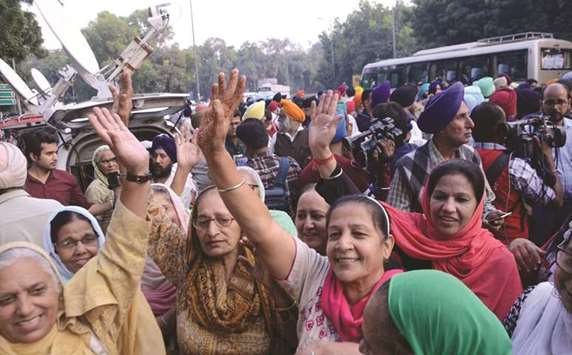A New Delhi court yesterday handed down a rare death sentence over anti-Sikh riots in 1984 that left nearly 3,000 dead following the assassination of prime minister Indira Gandhi.
Relatives of victims rejoiced in Delhi after the judge announced the sentence, the first since 1996.
It follows the setting up of a special probe in 2015.
Another convict was sentenced to life imprisonment, Public Prosecutor Surinder Mohit Singh said.
The special court had on Thursday convicted Yashpal Singh, who was sentenced to death, and Naresh Sherawat for killing two Sikhs and injuring three of their relatives during the riots in the Mahipalpur area of Delhi.
The 1984 carnage erupted just hours after then prime minister Gandhi was killed by her Sikh bodyguards.
It lasted three days with Sikhs raped and murdered, their homes and businesses torched.
The violence across the country but mostly in New Delhi saw people dragged from their homes and burned alive.
While finding the two guilty, Additional Sessions Judge Ajay Pandey had said the prosecution was able to prove “beyond reasonable doubt” that both the accused had taken out the victims who were hiding in a room and injured them with dangerous weapons with the intention to kill. They then threw them down from the first floor causing their death.
Few have been brought to justice over the massacre, with government-appointed commissions in the past failing to prosecute more than a handful of minor cases.
Gandhi was shot dead after ordering troops to storm the Golden Temple, Sikhism’s holiest shrine in Punjab.
The operation was to flush out Sikh separatists holed up inside.
Sikh leaders say the death toll from the pogrom that followed far exceeded the official figure of 3,000, and accuse leaders of Gandhi’s Congress Party of fanning the violence.
The Central Bureau of Investigation had blamed senior Congress leader Sajjan Kumar for inciting the mobs, but he was acquitted by a court in 2013.
This is the first verdict in a group of cases reopened for investigation by a special investigation team set up in 2015.
The Delhi police had closed the case in 1994 saying there was insufficient evidence.
Earlier in 1995, a trial court had convicted a man named Kishori for murder and ordered that he be hanged.
However, the Supreme Court in 1999 reduced the sentence to life imprisonment.
Kishori was convicted for violence in Trilokpuri in east Delhi on November 1 1984.
Aam Aadmi Party (AAP) leader H S Phoolka, who has been fighting anti-Sikh riots cases, said that yesterday’s verdict was the beginning of delivery of justice.
“This is a great verdict. We are thankful to the judge for this bold decision and this is the beginning of delivery of justice. Many cases are now pending which are at final stages. We are expecting that we will achieve success in those cases also,” Phoolka said.
Punjab Chief Minister Amarinder Singh also welcomed the sentence.
“Welcome the conviction by a Delhi court in the 1984 riots case. Justice has finally been meted out to the perpetrators of the heinous crimes. Hope the others involved in the attacks are also soon brought to book for their horrendous and inhuman acts,” he tweeted.

People celebrate outside the Patiala House Court after Additional Sessions Judge Ajay Pandey awarded the death penalty to Yashpal Singh and sentenced Naresh Sherawat to life imprisonment in the 1984 anti-Sikh riots case, in New Delhi yesterday.
